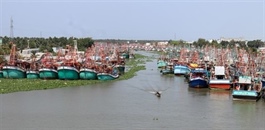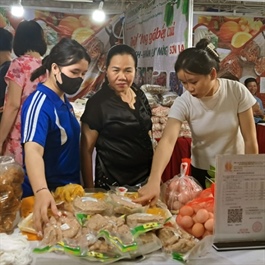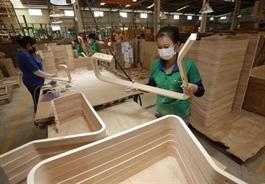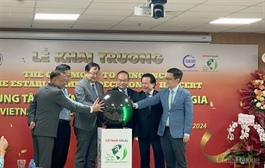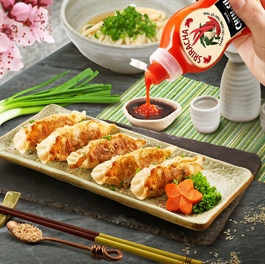Hanoi aims to lead the country in exporting OCOP products
Hanoi aims to lead the country in exporting OCOP products
Since 2019, the city has certified a total of 2,711 OCOP products, making it a national leader.
Hanoi is striving to become the country's pioneer in exporting One Commune One Product (OCOP) commodities, according to local insiders.
Last year, the city issued OCOP product certificates to 544 manufacturers in the capital. Since 2019, the city has certified a cumulative total of 2,711 OCOP products, placing it at the top in the country.
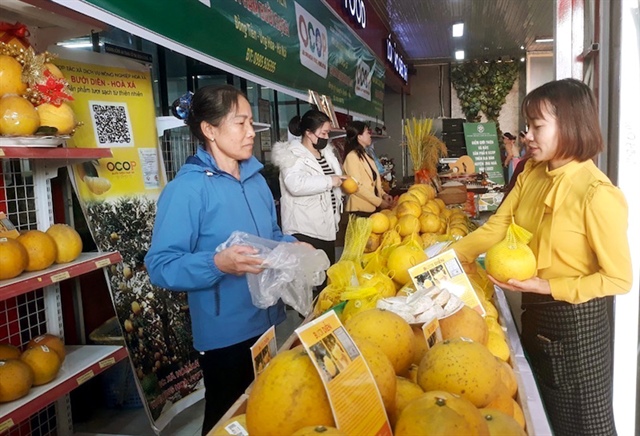
Local consumers shop at the OCOP showroom in My Duc District. Photo: Hoai Nam/ The Hanoi Times |
A highlight nationwide
Located in the city's main dairy farming area in Van Hoa Commune, Ba Vi District, Ba Vi Milk Joint Stock Company has participated in the OCOP from 2020 to date and obtained certification for 14 products.
According to company director Nguyen Thi Mai, since the certification, the firm has received support from the city and district authorities to develop refined and safe production processes.
She added that her company's milk and dairy products are now widely consumed throughout the country and are exported to neighboring countries such as Laos.
"Next year's sales are expected to be 20-30% higher than last year's," says Mai.
According to the Hanoi New Rural Development Program Coordination Office, the city has 2,711 OCOP products to date, becoming a shining example and leading the country in implementing the OCOP program.
OCOP products have held their own in the domestic market and are beginning to be exported, the agency said.
Several products that have received the city's four- and five-star OCOP classification have been exported to dozens of countries. These products include ceramics from Quang Vinh Ceramic Co., Ltd. (Gia Lam district), vermicelli from Minh Duong Food Joint Stock Company (Hoai Duc district), woven bamboo products from Phu Vinh Company (Chuong My district), and dairy products from Ba Vi Milk Joint Stock Company.
Nguyen Van Chi, Deputy Permanent Chief of the Hanoi Office of the New Rural Development Program Coordination, affirmed that Vietnam's OCOP products have advantages to compete in the global market.
He added that for the first time, the Hanoi New Rural Development Program Coordination Office, in cooperation with the Agricultural Trade Promotion Center (Ministry of Agriculture and Rural Development), set up an OCOP stand at Europe's largest handicraft fair in Milan, Italy. After this event, foreign traders visited Van Phuc village in Hanoi to buy silk products at the source.
From domestic success to global expansion
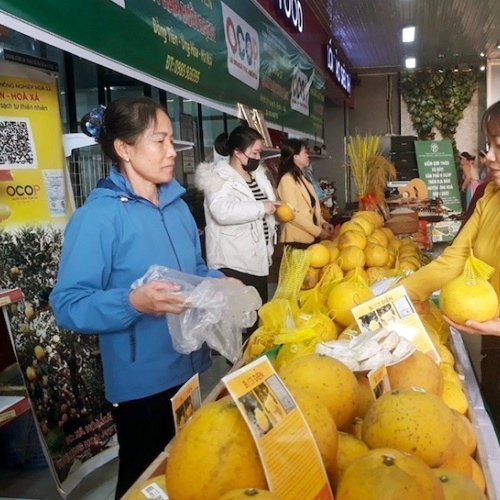
Me Tri Com green sticky rice, a specialty of Hanoi. Photo: Thoi Nguyen/ The Hanoi Times |
Despite achieving many positive results, the city's OCOP manufacturers still need to overcome limitations in order to gain a stronger foothold in the international market.
"Through the evaluation and grading process of OCOP products, we have found that many products still have rustic packaging, the product story is sketchy, and there is a lack of connection with local history and culture," said Ngo Van Ngon, deputy head of the Hanoi Office of New Rural Development Program Coordination. "OCOP producers have not yet mastered trade promotion," he added.
Nguyen Minh Tien, Director of the Agricultural Trade Promotion Center, believes that If OCOP products are successful domestically, they can expand globally.
He emphasizes that the key is to effectively tell the story of the product, establish uniqueness, understand the psychology and consumer preferences of the global market, and produce based on market demand rather than what you have.
"Therefore, there is a great need for interaction between traditional artisan villages, OCOP manufacturers and the world market to make appropriate changes in production," he emphasized.
At a recent conference, many OCOP businesses expressed their desire for the city to prioritize and strengthen trade promotion efforts to increase awareness of their products among consumers in the capital and throughout the country. They expected that their products would also have the opportunity to expand their market internationally.
To support this, the Ministry of Agriculture and Rural Development has selected exemplary OCOP products for export promotion in 2024.
Meanwhile, the Agricultural Trade Promotion Center will provide training to OCOP manufacturers in business management, design, packaging, market positioning and channel development.
The company recently signed a memorandum of understanding with the Hanoi Office of the New Rural Development Program Coordination to promote the consumption of OCOP products through Buudien.vn.
"We are also cooperating and partnering with other e-commerce platforms to export OCOP products," he added.
According to Anh, 7,157 OCOP products from 63 provinces and cities have been listed on this trading platform, accounting for nearly 70% of the total OCOP products in the country.
In order to facilitate the export of more OCOP products from Hanoi, Nguyen Van Chi, Deputy Permanent Head of the Hanoi New Rural Development Program Coordination Office, assures that the city will continue to support OCOP manufacturers..
This support will include the improvement of production processes, the enhancement of product quality, the emphasis on design and packaging, the support of OCOP units and traditional craft villages, and the intensification of trade promotion efforts, he added.
These activities will help make OCOP a strong brand that will be recognized and consumed by a wide range of domestic and international consumers, he emphasized.








